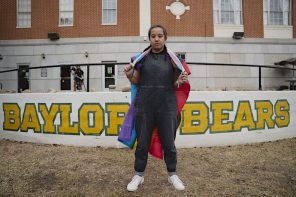On the surface, Dan Gilgoff is right in his latest US News column to tout famous “ex-gay” Alan Chambers’ new interview with Focus on the Family’s CitizenLink as “striking.” But, when studied, the interview is simply more of the same from the “ex-gay” camp.
What striking is that Chambers is not promoting so-called conversion therapy, which some religious conservatives claim can convert gays and lesbians to a straight sexual orientation. Rather, he acknowledges that, for gays and lesbians, homosexual attraction never goes away. But he suggests that homosexuals can resist those urges through Christianity
Gilgoff then goes on to quote the interview at length, especially this part:
CHAMBERS: The key thought here is the opposite of homosexuality isn’t heterosexuality. It’s holiness. There are people who are conflicted with their sexuality, involved with homosexuality, and there is a way out for those who want it. But it doesn’t say that they’re going into heterosexuality, because that’s not the point. The point is that people can leave whatever it is that God calls less than His best and move into something that is His best, becoming more like He is.
Honestly, this isn’t news. So-called “ex-gay ministries” have long given up the promise of turning homosexuals into heterosexuals. True, some who say they’ve “left homosexuality” have married opposite gender partners and had children. Here we can begin the long argument over Alfred Kinsey and his continuum of sexual orientation. No one is truly all gay or all straight. Those who may have “left homosexuality” and “become heterosexual” may truly fall somewhere near the bisexual part of Kinsey’s scale and therefore have some manner of “choice” in how they live out their sexuality.
For those of us who fall into the “predominantly” to “exclusively” homosexual part of Kinsey’s scale however, “ex-gay” ministries are beginning to realize that our sexual orientation will never change, no matter how well a lesbian learns to put on makeup and high heels or a man learns to love football without all that homoerotic longing. Pushing people into social constructs of gender does little to change the underlying sexual orientation. It’s literally like putting lipstick on a dyke – it just doesn’t make much difference in who she wants to date.
So, after admitting that their “ministries” cannot “change” a gay person into a straight person – they play the only card they have left – shame.
Chambers: For so long I’ve heard gay activists say to me, “You’re just in denial. You’re not grasping the reality of the situation. You’re just denying who you really are.” The truth is, I am in denial, but it is self-denial. I’m not in denial of who I used to be. I’m not in denial of the temptations that I could still experience. I am denying the power that sin has over me.
Sin does not have any power that we don’t give it, and what I’ve found is that my freedom – and the freedom of others I’ve known who’ve left homosexuality — was centered around denying what might come naturally to us regardless of how it got there. And once you deny sin’s power, you can live a free life.
If you can’t pray away the gay, you can at least pray away the urge to act on your gayness – because being gay is a SIN!
Gilgoff, to his credit, asks an actual gay person about all this claptrap – but disappointingly, he asks a secular gay person, Joe Solmonese – the president of the Human Rights Campaign, who says it’s a step in the right direction:
“And I’m going to respect people’s religious views, and if someone says, ‘I acknowledge that I am gay and will always be gay, but am going to live within context of Scripture as I view it and not act on that,’ I think that’s sad – it is denying my view, which is that we are all God’s children and are formed in his image – but at the very least it’s a shift in thinking. It’s not something I agree with but something that I’m willing to respect if somebody else decides to live with it.
Gilgoff makes his mistake though when he takes all of this as some sort of “common ground” between gays and lesbians and people like Chambers as “one that rejects conservatives’ former support for conversion therapy but also rejects the idea among some gay advocates that conservative religious homosexuals must cast off their faith and embrace their sexual orientation.”
Dan, there is a third way, and perhaps if you had sought the gay Christian point of view you would have found it. Gays and lesbians do not need to “cast off their faith” to embrace their sexual orientation. They can reconcile their faith and sexuality and live quite happily. I am both a lesbian and a Christian. While it’s true that Alan Chambers would deny my Christianity and say that I am living in sin, his opinion doesn’t make it so.
There are many gays and lesbians who have reconciled their sexual orientation and their sexuality. Groups abound and I’ve been to three conferences this year filled with gay and lesbian Christians including Evangelicals Concerned Western Region, the Gay Christian Network and The Evangelical Network. What you’ll note is that all of these groups hew to a more conservative view of the Bible. Not only have these gays and lesbians reconciled their sexuality and spirituality, but they continue to believe that the Bible is God’s word and that Jesus is their personal savior. In short, they are both Evangelical and Christian – something that might make Chambers’ head explode if he thought about it long enough.
While that may not seem like a place of “common ground” since Chambers and other conservative Christians would deny the “Christian” part of “gay Christian” – it’s just as valid as Gilgoff declaring the Chambers/Solmonese agreement as “common ground.” It only would be common ground if there were a genuine “live and let live” attitude on both sides, but there isn’t. Chambers and his cohorts are actively recruiting confused gays and lesbians to their “ministries.” They shamelessly prey on the fears of gays and lesbians who live in a society that discriminates against them and a church that demonizes them. It’s easier to believe the lie that being gay is a sin that needs to be struggled against and denied than it is to live fully into our God-given sexual orientation. Our society rewards us for “struggling” with our sexual orientation, but vilifies us for shrugging off society’s disapproval and living as we believe God would have us live.
There are a handful of scriptures that arguably condemn homosexuality – but those arguments are fairly recent. It’s only been since the 3rd Lateran Council of 1179 that the church even concerned itself with homosexual acts. Before then, as scholar John Boswell has documented, the church endorsed some same-gender relationships and ignored others. So, the condemnation of homosexuality as sin has not had such a long and storied tradition as Chambers and his “ex-gay” colleagues believe. In Christian history terms, it’s a fairly new development.
The idea of what is sin and what isn’t sin can change with the times. At one time it was sinful to be left-handed, sinful to marry outside one’s race, or sinful to divorce. Now, not so much. Sin, like gender, is often a social construct and can be changed. However, gays and lesbians don’t need to rely on changing social norms to change views on homosexuality. The Bible, when read in context, condemns homosexual acts that use or abuse another person like prostitution, rape, or pederasty. Loving, committed, gay or lesbian relationships are never condemned. To say that the Bible condemns homosexuality based on these passages is, by the same logic, to say that heterosexuality is condemned because David committed adultery with Bathsheba. Simply because one form of sexual expression is condemned does not make all forms of sexual expression “sinful.” Gays and lesbians who use their sexuality in a responsible – dare I say “holy” – fashion commit no sin.
While it’s refreshing to see Chambers own up to the lie that “ex-gay ministries” will not make one straight – it’s hardly an admission of “common ground” with gays and lesbians. Chambers’ agenda remains the same – to shame and vilify gays and lesbians and in the end, to wipe them from existence. That’s more of a killing ground than common ground.




